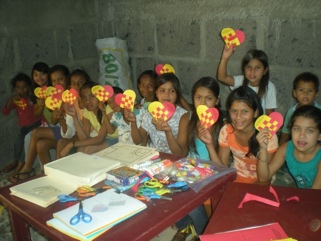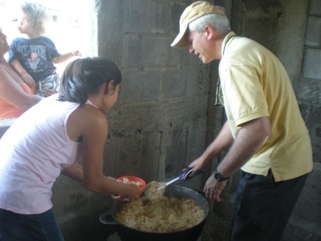I’ve been thinking a lot about Christian community, lately. About human connection, in the church and out of it. And weirdly enough, about what money has to do with those things.
See, as a pastor, I’m constantly wondering how to reach people beyond the walls of my church. As a 31-year-old pastor, I think especially hard about creating Christian community with young adults. And as a person who lives far away from her dearest spiritual friends, I think all the time about how much I miss those friends, because of how much authentic Christian community has meant to me in my own life.
Of course, I’ve been taught how to reach younger adults: meet in a bar, meet in a coffee shop, meet in people’s homes. And of course, I’ve been taught that it’s important for me to be part of a community beyond the church I serve: without it I’ll grow bitter, burn out, misbehave, so retreats, vacations and continuing education with friends are all mandatory.
Here’s the problem. After living in the real world of ministry for a number of years, I’ve realized that all of these “solutions” for creating community have one major thing in common: they all require money. And done regularly, no small amount of it!
In fact, I’ve started realizing that most of what typically fosters “connection” in the culture to which I belong requires money.
For instance, I’ve spent the better part of this rainy Monday reading, writing and thinking in my favorite coffee shop. For a few hours, my husband Lance sat beside me working on his sermon – one of the true blessings of sharing this clergy life together. Coffee shops are great. But meeting there once a week with a small group? That costs money: meal/coffee money, and gas money, and tip money. I might have the funds to do this – barely – but plenty of people just don’t.
I also found a few minutes to chat online with a dear friend in Chicago about some spiritual discernment I’ve been attempting. She invited me to visit her one day soon to continue that discernment process in person. If God’s Spirit is directing me to do this, then I’m sure I’ll be able to manage it – but purchasing a plane ticket is still really, incredibly difficult for Lance and me to do. In this era where so many of us scatter from each other because of jobs, schools, marriages, it costs a lot of money to maintain lifelong friendships!
Restaurants; movie theaters; vacations; road trips; shopping; coffee; sporting events; bars; clubs; parties; technology. These are all ways I commonly see – via media, social media, and in my own life – community being fostered. But they all. cost. money.
Now, I have absolutely no room to complain about my life’s needs being met. I’m fed, clothed, sheltered, and grateful for it. But in my sinful, #firstworldproblems riddled soul, I sometimes still feel isolated because of financial limitations! Lance and I just can’t always travel to see the people we love, or go out to eat, or join our friends on vacations, or any number of other things. And so I find myself wondering: are there other people – including but not limited to those termed “the poor” (a problematic term, but that’s another topic) – who feel isolated from this particular culture of connection because of their finances?
And then I also wonder – are there people who feel isolated from our churches, from Christian community, because of their finances???!
Judging by all the people I don’t see sitting in most churches’ pews, I’d bet the answer is yes.
The idea has slowly been growing within me that a whole lot of our current strategies for church-growth really depend on ministry to “the poor” and ministry with the privileged. How many of our forward-thinking strategies for Christian formation require people to be financially well-off to participate? Or at least to live in an area that has restaurants, bars, coffeeshops, yogurt shops, and bookstores in which to meet? (I pastor in Mississippi. This is a real issue for a lot of us.) Or to have homes that are large enough, with few enough people living in them, and are close enough to other church members, who won’t judge their style of living, to feel comfortable hosting a small group every week? Or to be able to afford to take time off for a weekend retreat or a week-long mission trip?
I wonder how many people might actually feel isolated by some of the church’s beautiful, life-changing, cutting-edge ministries — that are nonetheless so deeply embedded in consumerism that I’m not even sure where one begins and the other ends? I’m not knocking these ministries. I’ve participated in them, been formed by them, led them, encouraged them in my churches, and love them deeply. But I wonder . . .
How can we as the Church – and for me, as the United Methodist Church, especially – foster deep Christian community in ways that are distinctly non-consumerist, non-classist, and truly inclusive?
I believe that as the Church, that’s what we’re called to do. John Wesley found ways to do it. It’s in the Methodist DNA. But how are we being a force for such desperately-needed, authentic connection today?







